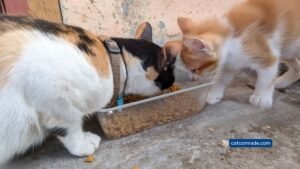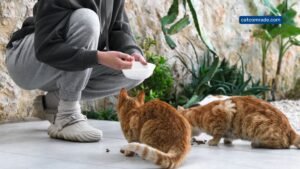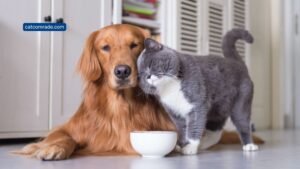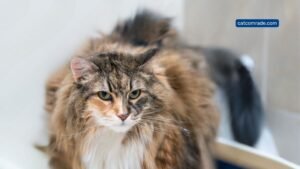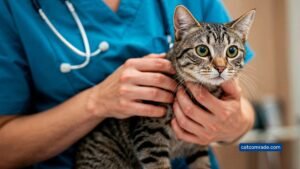What Can I Feed a Cat With Liver Problems: Safe & Nutritious Options
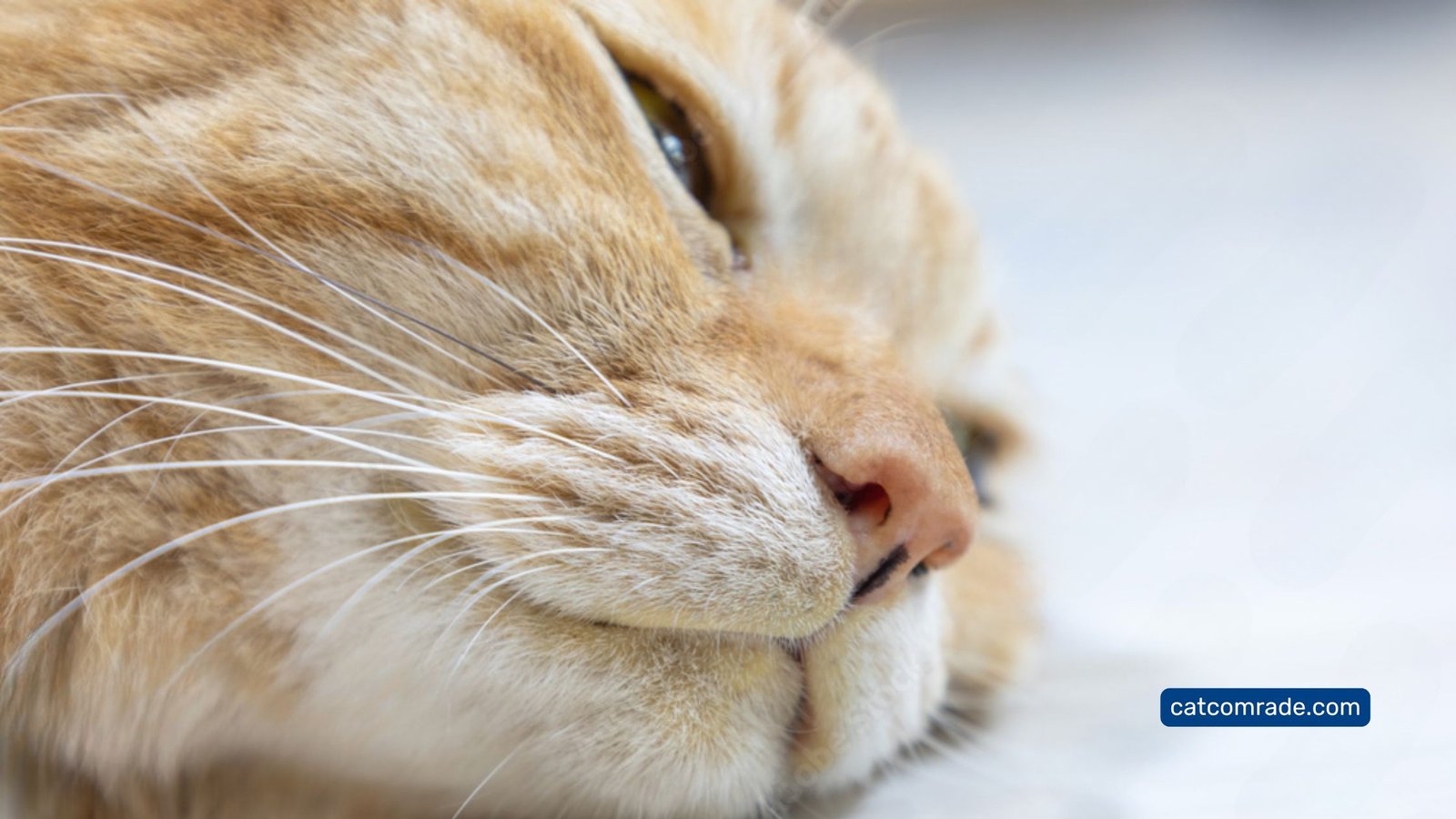
If your cat has liver problems, you’re probably worried about what to feed them. Choosing the right food can feel confusing and overwhelming.
But don’t worry—what your cat eats plays a huge role in helping their liver heal and stay strong.
You’ll discover simple, effective feeding tips that protect your cat’s health and make mealtime stress-free.
Keep reading to learn exactly what foods support your cat’s liver and which ones to avoid.
Your furry friend’s well-being depends on it.
Causes Of Liver Problems In Cats
Liver problems in cats can happen for many reasons. The liver is a key organ that helps clean the blood and digest food.
When it stops working well, your cat may feel sick quickly. Understanding the causes helps you care for your cat better.
Some causes come from infections, while others come from poisons or diet issues.
Some cats have liver problems due to other health conditions. Knowing these causes helps find the right food and care for your cat.
Infections And Parasites
Bacteria, viruses, and parasites can harm a cat’s liver. These infections make the liver inflamed and weak.
Common infections include feline infectious peritonitis and bacterial hepatitis. Parasites like liver flukes also cause damage.
Toxins And Poisons
Many chemicals harm the liver. Cats are very sensitive to medicines, plants, and household chemicals.
Even small amounts of some poisons can cause liver failure. Cleaning products and some human foods are dangerous for cats.
Fatty Liver Disease
Fat builds up inside the liver cells. This happens if a cat stops eating for days. Overweight cats are at higher risk.
The liver cannot work well when clogged with fat.
Genetic And Metabolic Disorders
Some cats inherit liver problems from their parents. These problems affect how the liver works.
Metabolic diseases change how the liver processes food and toxins. These conditions need special care and diet.
Other Illnesses Affecting The Liver
Diseases like cancer and heart problems can also hurt the liver.
Sometimes, liver damage comes from infections in other parts of the body. Treating the main illness helps protect the liver.
Symptoms To Watch For
Watching for symptoms of liver problems in cats is very important. Early signs can help catch issues before they get worse.
Cats hide pain well, so careful observation is key. Knowing what to look for makes a big difference in their care.
Changes In Appetite
A cat with liver problems may eat less or stop eating. Sudden loss of interest in food is a warning sign.
Sometimes cats may vomit after eating or show discomfort.
Weight Loss And Weakness
Unexplained weight loss happens when the liver cannot work well. Weakness or less activity can follow.
Your cat might sleep more and avoid playtime.
Yellowing Of Skin And Eyes
Yellow skin or eyes is called jaundice. It happens when the liver fails to remove toxins.
This is a clear sign of liver trouble.
Changes In Urine And Stool
Dark urine or pale stool can indicate liver problems. These changes happen because the liver does not process waste properly.
Behavioral Changes
A sick cat may act confused or less aware. This happens if liver toxins affect the brain.
Watch for strange behavior or difficulty walking.
Nutritional Needs For Cats With Liver Issues
Cats with liver problems need special care in their diet. Their liver cannot work as well as before. This makes nutrition very important.
The right food helps the liver heal and keeps your cat strong. Feeding the wrong food can make the problem worse.
Understanding their nutritional needs helps you choose the best diet for your cat.
Protein Needs For Cats With Liver Issues
Protein is important for all cats. But too much protein can hurt a sick liver. Cats with liver problems need moderate protein.
Choose high-quality protein that is easy to digest. Fish and chicken are good options.
Avoid low-quality protein or too much protein in the diet.
Fat And Energy Requirements
Fat provides energy and supports body functions. Cats with liver disease may have trouble using fat.
Feeding moderate fat helps balance energy needs. Use fats that are easy to digest, like fish oil.
Avoid very high-fat meals that stress the liver.
Carbohydrates And Fiber
Carbohydrates give energy and help digestion. Cats need fewer carbs than dogs, but some carbs are helpful.
Fiber helps keep the digestive system healthy. Some fiber also helps remove toxins.
Choose easily digestible carbs like rice or pumpkin. Avoid high-fiber or grain-heavy foods.
Vitamins And Minerals
Vitamins and minerals support liver repair. Cats with liver problems may need supplements.
Vitamin E, B vitamins, and zinc are often useful. Too much copper can harm the liver.
Foods low in copper help protect the liver. Talk to your vet about the right vitamins and minerals.
Hydration And Water Intake
Water is vital for all cats, especially with liver issues. Proper hydration helps the liver flush out toxins.
Wet food can increase water intake. Always provide fresh, clean water.
Encourage your cat to drink often to stay hydrated.
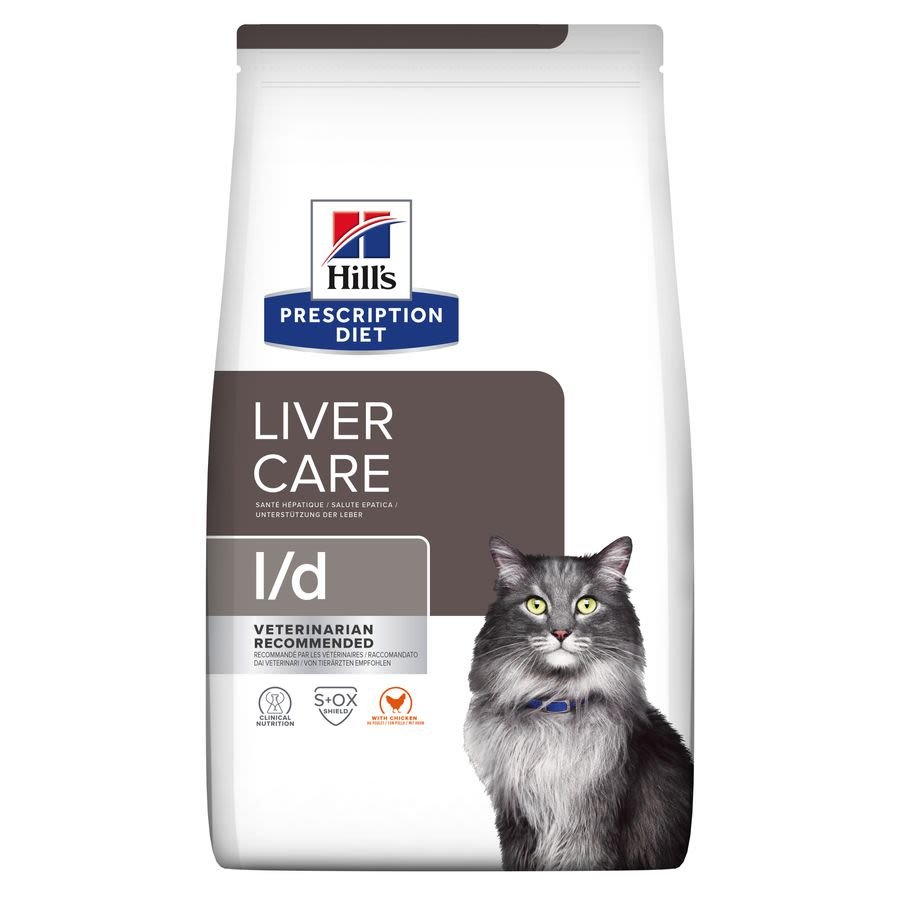
Credit: pet-supermarket.co.uk
Safe Protein Sources
Choosing safe protein sources is crucial for cats with liver problems. Their liver needs gentle, easy-to-digest proteins.
This helps reduce strain and supports healing. Not all proteins are equal.
Some can worsen liver issues or cause digestive trouble. Focus on proteins that provide essential nutrients without harming the liver.
Lean Meats
Lean meats like chicken and turkey are good choices. They have less fat, which is easier on the liver.
Always cook the meat fully and avoid adding spices or sauces. Cut the meat into small pieces for easy eating.
Lean meats supply important amino acids that help repair the liver.
Cooked Eggs
Cooked eggs are another safe protein source. They are rich in protein and easy to digest.
Avoid raw eggs to prevent infections. Scrambled or boiled eggs work best.
Eggs also provide vitamins that support liver health. Feed eggs in moderation to prevent excess protein intake.
Fish Options
Some fish types can benefit cats with liver problems. Salmon and white fish are good choices.
Cook the fish thoroughly and remove all bones. Fish offers omega-3 fatty acids that reduce inflammation.
Avoid oily or processed fish to keep the liver safe. Fish should be a small part of the cat’s diet.
Recommended Carbohydrates
Cats with liver problems need special care in their diet. Carbohydrates are an important part of that diet.
They provide energy without putting stress on the liver. The right carbohydrates help support liver function and overall health.
Some carbohydrates are easier to digest and better for cats with liver issues.
Rice
Rice is a gentle carbohydrate for cats with liver problems. It is easy to digest and low in fat.
Rice provides steady energy and helps keep blood sugar stable. White rice is often preferred because it is softer on the stomach.
Always cook rice well before feeding it to your cat.
Pumpkin
Pumpkin is a great source of fiber and vitamins. It supports digestion and helps regulate bowel movements.
Pumpkin is low in calories and gentle on the liver. Feeding small amounts of cooked pumpkin can improve your cat’s digestive health.
Avoid canned pumpkin with added sugars or spices.
Sweet Potato
Sweet potato is a nutrient-rich carbohydrate option. It contains vitamins A and C, which support immune and liver health.
Sweet potatoes are easy to digest when cooked properly. They provide energy without overloading the liver. Always serve plain, cooked sweet potato without any seasoning.
Vitamins And Supplements
Vitamins and supplements play an important role in supporting cats with liver problems. They help protect the liver and improve its function.
Proper vitamins can boost your cat’s overall health. Supplements may also reduce liver inflammation and support healing.
Vitamin E
Vitamin E is a strong antioxidant. It helps protect liver cells from damage. This vitamin supports the immune system too.
Cats with liver issues often have low vitamin E levels. Giving vitamin E can help reduce liver stress. Always check the right dose with your vet.
B-complex Vitamins
B-complex vitamins support energy and metabolism. They are important for liver health. These vitamins help repair damaged liver tissue.
Cats with liver problems may need extra B vitamins. B-complex can improve appetite and strength. It also supports the nervous system.
Milk Thistle
Milk thistle is a popular herb for liver care. It contains silymarin, which protects liver cells. This supplement helps reduce inflammation and aids healing.
Milk thistle can improve liver function in cats. Use it under a vet’s guidance for safety and dose.
Foods To Avoid
Choosing the right food for cats with liver problems is critical. Some foods can worsen their condition and harm the liver.
Avoiding certain items keeps your cat safe and comfortable. This section covers foods to avoid to support your cat’s health.
High Fat Items
High-fat foods stress the liver and slow down recovery. Fatty meats, fried foods, and heavy dairy products can cause harm.
Limit oily fish and rich sauces. These foods may lead to digestive problems and worsen liver disease.
Toxic Foods
Some common foods are toxic to cats and damage the liver. Avoid onions, garlic, grapes, and raisins.
Chocolate and caffeine are also dangerous. Even small amounts can cause severe reactions and liver failure.
Processed Treats
Processed treats contain chemicals, preservatives, and high salt. These ingredients burden the liver and affect its function.
Avoid store-bought snacks and treats with artificial additives. Choose fresh, natural treats for better health.
Homemade Diet Tips
Feeding a cat with liver problems requires special care and attention. A homemade diet can help control symptoms and support liver health.
Preparing meals at home lets you choose fresh, healthy ingredients. This helps avoid additives and harmful substances found in some commercial foods.
Focus on low-protein, high-quality ingredients to reduce the liver’s workload. Balance is key to providing enough nutrients without causing harm.
Here are some simple tips to guide you in making homemade meals for your cat.
Choose Lean Protein Sources
Lean meats like chicken or turkey are easier on the liver. Avoid fatty cuts and processed meats. Cook the meat thoroughly to kill bacteria.
Remove skin and fat before feeding. Small portions help prevent strain on the liver.
Include Easily Digestible Carbohydrates
Rice and sweet potatoes are good carbohydrate options. They provide energy without stressing the liver. Cook them well until soft.
Avoid grains that might cause allergies or digestion problems. Carbohydrates should be a small part of the diet.
Add Liver-friendly Supplements
Supplements like milk thistle can support liver function. Always check with your vet before adding supplements. Use only vet-approved doses and forms.
Avoid giving human supplements without advice. Natural sources can also provide vitamins and antioxidants.
Monitor Fluid Intake
Hydration is crucial for cats with liver issues. Offer fresh water at all times. Wet food helps increase fluid intake.
Avoid salty or processed ingredients that cause dehydration. Keep an eye on your cat’s drinking habits daily.
Prepare Small, Frequent Meals
Small meals reduce the liver’s workload. Feed your cat 3 to 4 times a day. Avoid large, heavy meals.
This helps maintain steady energy levels. Frequent feeding also improves digestion and nutrient absorption.
Commercial Diets For Liver Health
Commercial diets designed for cats with liver problems play a key role in managing their health.
These diets help support liver function and reduce the workload on this vital organ.
They contain balanced nutrients that are easy to digest and absorb.
Specially formulated commercial foods often have controlled protein levels. Too much protein can be hard on a sick liver.
These diets use high-quality proteins to provide essential amino acids without causing extra stress.
Many commercial diets for liver health also include antioxidants. These help fight liver damage and support cell repair.
They often contain vitamins E and C, which protect the liver from harmful substances.
Low copper content is another feature of these diets. Excess copper can accumulate in the liver and worsen disease.
Commercial liver diets keep copper levels in check to protect the liver.
Prescription Liver Diets
Prescription diets are made by veterinary companies. They are tested to meet the needs of cats with liver problems.
These diets are only available through a vet’s recommendation.
They contain controlled proteins, antioxidants, and low copper. These features help reduce liver inflammation and improve function.
Prescription liver diets are easy on the digestive system.
Over-the-counter Liver Support Foods
Some non-prescription foods support liver health. These products include added vitamins and herbs.
Ingredients like milk thistle may help liver detoxification.
These diets are not as strict as prescription foods. They can be a helpful addition to regular cat food.
Always check with a vet before switching diets.
Wet Vs Dry Commercial Liver Diets
Wet diets provide more moisture, which helps hydration. Cats with liver issues often need extra fluids. Wet food is easier to eat for some sick cats.
Dry diets last longer and are more convenient. They can support dental health but may need added water. Choose the type your cat likes and tolerates best.
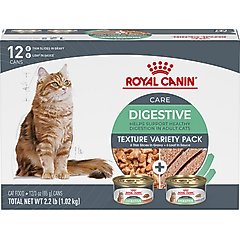
Credit: www.chewy.com
Feeding Schedule And Portion Control
Feeding schedule and portion control play a key role in managing liver problems in cats.
A regular feeding routine helps maintain steady energy levels and supports liver health.
Small, frequent meals reduce stress on the liver and improve digestion. Proper portion sizes prevent overeating, which can worsen liver issues.
Careful attention to feeding times and amounts makes a big difference.
It keeps your cat comfortable and aids in recovery. Setting a clear schedule also helps you monitor your cat’s eating habits and health progress.
Establishing A Consistent Feeding Schedule
Feed your cat at the same times daily. Aim for four to six small meals spread evenly.
This keeps blood sugar stable and liver workload low. Avoid large meals that force the liver to work harder.
Consistency helps your cat feel secure and reduces stress.
Determining The Right Portion Sizes
Portion control is vital for cats with liver problems. Follow your vet’s advice on meal size based on your cat’s weight and condition.
Use a kitchen scale or measuring cup to ensure accuracy. Small portions prevent overeating and support proper digestion.
Adjust portions gradually if your cat’s weight changes.
Monitoring And Adjusting Feeding Habits
Watch your cat’s reaction to the feeding schedule and portions. Note any changes in appetite, energy, or stool quality.
Consult your vet if your cat refuses food or shows signs of discomfort. Adjust meal frequency or size as needed under veterinary guidance.
Regular monitoring helps maintain optimal liver health.
When To Consult A Veterinarian
Knowing when to consult a veterinarian is important for cats with liver problems. Liver issues can be serious and may get worse without proper care.
Early help from a vet can improve your cat’s health and comfort.
Watch for changes in behavior, appetite, and energy. These signs can show if your cat needs medical attention.
Don’t wait too long to ask for professional advice.
Signs Your Cat Needs Immediate Veterinary Care
Look for vomiting that won’t stop or severe diarrhea. Sudden weakness or difficulty standing also needs quick vet attention.
Yellowing of the skin or eyes is a clear warning sign.
Regular Check-ups For Cats With Liver Issues
Schedule routine exams to track your cat’s liver health. Blood tests help monitor liver function and spot problems early.
Keep these visits even if your cat seems fine.
Questions To Ask Your Veterinarian
Ask about the best diet for your cat’s liver condition. Find out about safe medications and supplements.
Learn how to spot warning signs at home.

Credit: www.reddit.com
Frequently Asked Questions
What Foods Are Best For Cats With Liver Problems?
Cats with liver issues benefit from easily digestible, high-quality protein sources. Cooked chicken, turkey, and fish are ideal.
Avoid fatty and processed meats. Low-fat, high-protein diets support liver function and reduce strain. Always consult a vet for tailored dietary advice.
Can Cats With Liver Problems Eat Commercial Cat Food?
Yes, but choose prescription or veterinary diets designed for liver health. These foods have balanced nutrients to support liver function.
Avoid regular commercial cat food with high fat and additives. Always check with your vet before switching diets.
How Much Protein Should A Cat With Liver Disease Consume?
Cats with liver disease need moderate protein, enough to maintain muscle but not overload the liver. Typically, 25-30% protein content is recommended.
Always follow your veterinarian’s guidance, as requirements vary based on disease severity and individual cat needs.
Are Supplements Helpful For Cats With Liver Problems?
Certain supplements like SAMe, milk thistle, and vitamin E may support liver health. They can reduce liver inflammation and promote healing.
Always consult your vet before adding supplements, as some may interfere with medications or worsen conditions.
Conclusion
Cats with liver problems need special care in their diet. Choose foods low in fat and protein but rich in nutrients. Fresh water must always be available.
Regular vet visits help track your cat’s health. Watch for any changes in appetite or behavior.
Feeding the right food supports healing and comfort. Small, frequent meals can make digestion easier. Always avoid harmful ingredients like onions or garlic.
Feeding your cat carefully can improve its quality of life. Simple steps make a big difference for cats with liver issues.

